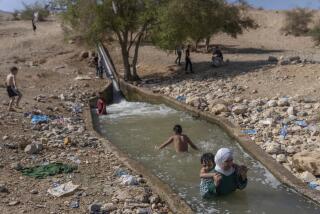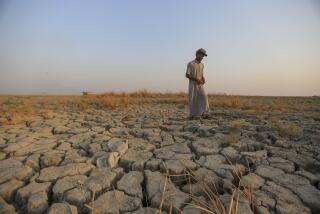Turkey Thirsts to Export Excess Water
- Share via
MANAVGAT, Turkey — North of the parched deserts of the Middle East, black hoses 1 1/2 feet across shoot drinking water into the Mediterranean Sea.
The geysers gush from a pilot pumping station that Turkey has built as part of its effort to sell water to other countries.
Turkey has huge water reserves, and officials said that by next year converted oil tankers could be hauling its water to drought-stricken nations throughout the region.
That could reduce tensions at a time when Israel, Syria, Jordan and the Palestinians are bitterly contesting increasingly scarce water supplies.
Water sales also could boost Turkey’s position as a regional power and earn the country tens of millions of dollars in badly needed hard currency.
“If they know that you have water that you can give away, it changes the politics of the region,” said Dogan Yemisen, deputy director of DSI, Turkey’s water authority.
Experts from Israel, Jordan and Libya have visited the pumping station in Manavgat, 45 miles east of the Mediterranean resort city of Antalya.
Israel is negotiating to buy 13.1 billion gallons of water a year from Turkey, about 7% of its drinking-water needs and the maximum amount that could be delivered by tanker through the Israeli port of Ashkelon. Both sides say a five-year deal could be reached soon.
Turkey has the pumps and pipes to export four times that much water and could double that figure within a year.
But potential customers are hesitating, worried about the untested technology and the impact of having Turkey control a resource as vital as drinking water.
“It is the quick answer, but it is not for the long term,” said Amos Epstein, director of Mekorot, Israel’s water authority.
Epstein said Israel is concerned there could be technical problems or delays during the pumping, transporting or unloading of water. Politicians in Israel also say it is crucial that their country not be dependent on another nation for such an important resource.
In the region’s Arab countries, where people recall Ottoman Turkish domination, the idea of depending on Turkey is especially sensitive.
Turkey also has serious water disputes with neighboring Iraq and Syria, which are demanding that Turks allow more water to flow down the Euphrates and Tigris rivers, which cross through the countries.
Although there have been reports in the past that Arab countries objected to earlier plans to sell water to Israel, Turkish officials said they have heard no such complaints recently.
“This is for the benefit of all the countries in the region and maybe even the peace process,” said Bulent Gokay, a water expert at the Turkish Foreign Ministry. “This is a project that will help bring people together in the Middle East.”
Yet experts say Turkey is likely to be able to export water for only another decade or two before it feels the pinch of its expanding population.
“Turkey will never be a water source for the entire Middle East,” said Seyfi Tashan, a water analyst at Bilkent University in the Turkish capital, Ankara.
The region’s water problem “is far bigger than Turkey or any other country,” he said.
The only long-term solution is desalination, experts say. But Turkish officials argue that building plants to purify salt water not only is expensive but also will leave nations dependent on energy producers.
There also is disagreement on whether shipped fresh water would be cheaper than desalinated water.
Turkish officials say desalination would cost about $4.10 per thousand gallons, which would allow them to make a profit on fresh water sold for a lower price.
But Israeli experts say they could desalinate water for about $2.30 per thousand gallons, so Turkish fresh water might be a bit more expensive.
Price is a key issue being negotiated between the two sides.
At the $147-million Manavgat water plant, a series of pumping and treatment stations, water is sucked out of the Manavgat River and either sent to a treatment and purification plant or pumped directly to a filling station, depending on the needs of a potential customer.
The plant is located in the rolling hills of southern Turkey, amid wheat and vegetable fields. Cows graze near the seven-mile pipeline that carries the water to the sea. Water would be pumped into converted oil tankers moored to huge yellow floating stations two miles offshore.
Turkey already ships 1.8 billion gallons of water from another river each year to the Turkish portion of the divided island of Cyprus. That is about half of the Turkish area’s water needs.
For now, the four huge black hoses that would fill tankers at Manavgat just spew water into the sea as workers test the plant.
“No buyers,” said Hasan Denker, the plant’s director.
More to Read
Sign up for Essential California
The most important California stories and recommendations in your inbox every morning.
You may occasionally receive promotional content from the Los Angeles Times.













